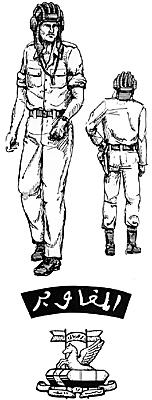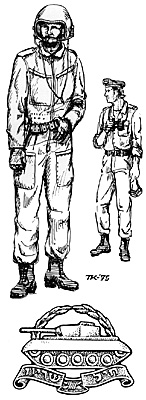
Egyptian Tanker
After three years of intensive training as a member of the regular army, the Egyptian tanker was better prepared for the October War, which he would call the Ramadan War, than any of his predecessors had been for prior Arab-Israeli conflicts. Dramatic reforms in the Egyptian Army policy, occurring as a result of the 1967 debacle and Soviet prodding, insured that he was better fed, in better health, paid on a regular basis, and better educated than previously. His battalion education and moral guidance officer saw to it that he was indoctrinated with a steady diet of anti-Jewish propaganda and the imperative to redeem Arab honor. Continual by-the-numbers drills insured that he was adequately trained for the set-piece maneuver of crossing the Suez Canal, in true massive and heavy-handed Russian style.
(TOP): Syrian shoulder titic for armored troops white letters embroidered on black felt background. Branch color for officers' shoulder straps and background for enlisted men's chevrons is gray.
(BOTTOM): Egyptian Cavalry/Armor badge, worn by officers only. Branch color for officers' shoulder straps and background for enlisted men's chevrons is green.
Soviet influence was apparent not only in the strategy, tactics, and weapons he used, but also in the Soviet-pattern tank helmet he wore with the standard Egyptian two-piece khaki uniform. Officer leadership at battalion- and company-levels had improved as the result of the induction of college graduates with technical degrees into the officer corps. There was more contact between officers and enlisted men, and with Soviet advisors operating with every battalion, training was considerably improved although Arab-Russian friction was a continual problem.
On the defensive, in holding the bridgehead on the east bank of the Suez Canal, he would prove as brave and doggedly steadfast as he had been in the 1967 War. But when launched in the breakout attempts towards the Sinai passes and thrown into the melee at the Chinese Farm, he lacked initiative, flexibility, and communication -- prime requisites in the fluid situations of mobile warfare.
More sophisticated than his Syrian counterpart, the Egyptian tanker learned the techniques of modern warfare quicker, maintained his equipment better, and fought in a less savage manner. A better soldier than his forerunners, he was still not good enough.
 Jewish Tanker
Jewish Tanker
The Jewish tanker, a reservist, was equipped with more modern and better weapons in greater quantity than ever before. He required no indoctrination to motivate him, knowing that an Arab victory meant not just military defeat, but the genocidal annihilation of his family, society, and culture as well.
Right: Israeli Armored Corps cap badge, worn on black beret. The Jews classify their mechanized infantry as "armored personnel" and both the tankers and infantry within the armor units wear the badge.
Some Western observers thought he had grown slack and overconfident after the quick victory of 1967, while his occasional disparaging remarks about Arab military prowess struck some outsiders as an annoying display of Jewish arrogance. On the parade ground, his casual bearing and dress would cause most Western officers to despair of his ever becoming a disciplined trooper. Whether in his one-piece green tanker's coverall and U.S.-style combat vehicle crewman's helmet, or the two-piece fatigues with the ubiquitous black tanker's beret, he proudly remained an individual.
But he was a thinking individual with a clearly defined purpose and a highly developed sense of esprit, not an over-drilled cypher in a lock-stepping horde. Superbly trained to achieve and maintain maximum performance with his weapons, his tank gunnery was devastatingly accurate at phenomenal ranges. And although hostile fire might immobilize his tank, as long as the gun functioned and there was a crewman alive to work it, the tank would continue to fire.
Aggressive to the point of rashness at times, in an unforseen tactical situation he would, ironically, obey the old Wehrmacht precept to do something -- even if it were wrong -- rather than follow the all too common military maxim of waiting for the word. The communication and understanding that existed between all ranks, best of any army in the world, insured that if his officers and NCO's were killed or wounded, he could still be relied upon to carry out his unit's mission on his own initiative.
The cocksureness resulting from victory in the 1967 War quickly disappeared under the Arab onslaught in the early days of the Yom Kippur War. Mobilizing in record time, the Jewish tanker stood on the defensive, absorbed the Arab blows, and swung over to the offensive. Outnumbered on all fronts, at all times, he smashed his opponents once more.
Quite possibly, he was the best tanker in the world.
More Arab-Israeli Armor 1973
-
Arab-Israeli Armor 1973: Introduction
Arab-Israeli Armor 1973: T-54/55/62
Arab-Israeli Armor 1973: M-48/60
Arab-Israeli Armor 1973: Centurion Mk 5
Arab-Israeli Armor 1973: TO&E
Arab-Israeli Armor 1973: Jewish Tank Markings
Arab-Israeli Armor 1973: Tanker Crew
Arab-Israeli Armor 1973: Comparative Data (Chart)
Arab-Israeli Armor 1973: Comparative Ammunition
Arab-Israeli Armor 1973: Observations and Conclusions
Arab-Israeli Armor 1973: Paper Tanks
Arab-Israeli Armor 1973: Bibliography
Arab-Israeli Armor 1973: Glossary of Terminology
Arab-Israeli Armor 1973: 1/64 Scale Illustrations (extremely slow: 439K)
Back to Table of Contents -- Conflict Special Study 1
Back to Conflict List of Issues
Back to MagWeb Master Magazine List
© Copyright 1975 by Dana Lombardy.
This article appears in MagWeb (Magazine Web) on the Internet World Wide Web. Other military history articles and gaming articles are available at http://www.magweb.com